Sukhia Pokhari and Darjeeling
“If a man has no tea in him, he is incapable of
understanding truth and beauty.” – A Japanese proverb on tea and life.
Despite everything, leaving Lava behind was difficult. I had wanted so much to succeed in terms of
my own personal journey and it really felt like I had failed miserably. I was definitely proud of my time at the
school and we made a good deal of progress over the nine days. But all the lessons I thought I had been
learning about myself, as a person, seemed to unravel in Lava and I wondered if
I had really learned or improved anything about myself at all. On my final day, I visited the
monastery. I took food donations. I sat in the calm of the monastery during
lunch time and began to think of the things that had gone wrong (those both, in
my control and out of my control) and why they had affected me so badly. As I was sitting there with my eyes closed, a
young voice, very close to my ear, said, “Uncle, where are you from?” As I opened my eyes, a little girl (about 11
years old was smiling at me. We engaged
in a simple dialogue for a few minutes before she left with her family. I returned to my position with eyes closed. It was a therapeutic forty minutes and I left
feeling quite a bit brighter about things.
When I returned to Kalimpong, I visited a doctor and got
sorted with medication for a couple of the ailments I was suffering. Whilst there, I also got diagnosed with a
sinus infection for which he gave me antibiotics. I did wonder about the orange discharge from
my nasal passages (and before you moan, just be glad I am not over sharing with
some of the other health concerns!!). I
also decided to visit an orphanage school at which a friend helps out. Now, that was the right decision - I chatted
with the children, we acted out the Three Billy Goats Gruff (the staff only
looked mildly concerned as we used a desk as the bridge) and played chess at
break times. I took an impromptu meeting
with the teachers and they decided that I would return for two days (the last
two ‘free’ days I have until I leave) when I would do some teaching and also
some teacher training. I met up with
Premika and Santa, but rather than burden them, I stayed with Moa and his wife.
Whilst in Kalimpong, Moa was able to
clear my pen drive of the virus which had corrupted it, saving almost all the
files (how lucky was I to meet someone who used to work for Hewlett Packard!?). On the Saturday, in town, I visited another
monastery, a Hindu temple and a church, built in the style of a monastery. It was just the exercise and clearing of the
head I needed. In addition, whilst I was
walking around town, I bumped into no less than 5 people I knew. Staff at different village schools or family
or friends of other people I knew in the villages. It seemed like I had come home. It was thrilling to be called out to. I couldn’t quite believe how everything,
suddenly seemed to have turned, and I was so much more at peace than a mere six
days prior. What a difference a week can
make. I resolved to try very hard to
keep this positivity for as long as possible.
(Kalimpong Park)
(Monastery)
(Huge prayer barrels)
(Temple)
(Church built in the style of a monastery)
(Church bell tower)
(Kalimpong with a view of the more traditional looking church built on a hill)
In that same weekend I attended the 7th Annual
Foundation Day for Run with Roshni, a charity I have spoken about before, which
encourages people (of all ages) to run as a way of keeping fit, staying healthy
and to relieve tension. It was a morning
and lunchtime event and was well attended by lots of important local
people. The highlight was hearing from
the young athletes who had recently taken part in 5km, 10km and 21km runs as a
result of their association with the charity.
One 19-year old had a time of 1hr 16 minutes for a half marathon! Incredible.
At the end of the event I had to make my way to Sukhia
Pokari. Another high altitude, cold
destination, I was determined that my new-found positivity was not going to let
me down. On the way, I began to realise
that, with the arrival of the 17th March, so came the beginning of
the end of my journey to India. Although
there were still a few weeks left, I would be spending just three days in each
school and at each one I would need to say a final farewell before travelling
to the next. I vowed to make the most of
it. Otherwise, time would fly, and I
would be on that flight to Delhi before I knew it.
Sukhia Pokhari was cold, but not as cold as Lava and I was at
a fantastic homestay with the Headteacher and his father. There were even memories from home on the wall.
Both were very hospitable, and it was great to be able to chat to Pramod (Head) outside of school and make the most of the time we had to discuss next steps for the school. Pramod’s wife and son live near Kolkata, which is a long overnight train ride away, but Pramod has spent his life in Sukhia Pokari. Another friend (Shakti) who I had met at the wedding in Barack a few weeks previously, also lived in Sukhia Pokari. After bumping into one another in the street, we met for tea and, as he is a college lecturer, he persuaded me that on the middle Saturday of my two-week stay in Sukhia, I should attend his college and engage with the students and perhaps talk to staff. It was a great feeling to have bumped into someone I knew in a totally new place and it really gave me another boost. What a pendulum swing away from the previous week in Lava! It was hard to believe how many positive things happened in such a short space of time.
(Run with Roshni presentation)
(Photos to remind me of home)
Both were very hospitable, and it was great to be able to chat to Pramod (Head) outside of school and make the most of the time we had to discuss next steps for the school. Pramod’s wife and son live near Kolkata, which is a long overnight train ride away, but Pramod has spent his life in Sukhia Pokari. Another friend (Shakti) who I had met at the wedding in Barack a few weeks previously, also lived in Sukhia Pokari. After bumping into one another in the street, we met for tea and, as he is a college lecturer, he persuaded me that on the middle Saturday of my two-week stay in Sukhia, I should attend his college and engage with the students and perhaps talk to staff. It was a great feeling to have bumped into someone I knew in a totally new place and it really gave me another boost. What a pendulum swing away from the previous week in Lava! It was hard to believe how many positive things happened in such a short space of time.
On the second night of my three night stay at the first of
the three Darjeeling (Sukhia Pokari) schools, I was taken to a ceremony whereby
the parents of a newly married groom visit the parents of the groom’s bride to
deliver the news of the marriage. You
may remember me talking about this when I attended the wedding with Mahendra
and Kalpana a few weeks ago. Well, now I
have experienced the ceremony. To be
honest I was a little scared. If you
remember, a bride and groom will elope and get married, without anyone’s
knowledge. When they return, they inform
the groom’s parents (with whom they live) and within 3 days, it is the
responsibility of the groom’s parents to inform the bride’s parents to say she
is married, safe and being well looked after.
We were at the house of Pramod’s cousin. His daughter had eloped and that night her
father-in-law was coming to inform her family officially. Many of the groom’s male relatives (7) arrived
together. I can really only describe it
as a stand-off – no literally, there was…a stand-off. The groom’s parents offered gifts and stood
outside in the drizzle. The bride’s
family all stood in the house looking out at the gifts, and conversing, each
offering their opinion. After finally
receiving the gifts and with all the males from the bride’s family looking on,
the bride’s father and grandfather eventually invited the groom’s family in. Much talking (very serious, straight talking)
ensued as the bride’s male family members tried to find out as much as possible
about the groom’s family – jobs, size of family, success etc. Basically, was the groom good enough for the
bride? It was quite a thing to
witness. The families also discussed
what type of ceremony they will hold to celebrate the marriage.
The whole event was a very intimate, slightly uncomfortable
and strangely emotional thing to witness.
I guess in the whole animal kingdom there are examples of the male of
the species preening himself and showing his best in order to win the female or
a higher position. It felt like a very
similar thing was going on that night.
But it was very interesting, and I only wish I understood Nepali better
so I could have gleaned even more from the evening.
As the formal bit of the discussions began to end, a brass
tray with rice and gifts was placed on the table and given to the bride’s
family. Drinks were handed out and the
conversation turned more informal and relaxed.
The one real thing that will stick in my mind from the evening though,
is the look on the bride’s parents faces.
They seemed quite bereft by the experience and it is easy to see why
when they were completely in the dark about their daughter’s marriage until
after the event. For me, it gave me
another piece of the jigsaw to fit nicely into the picture of what must have
happened in Kalpana’s family before her niece’s big wedding celebration at the
beginning of February, which I felt such an integral part of. It is funny how, at each different homestay,
I witness or learn something new, often casting light on something that I have
seen or experienced on a previous occasion.
Pramod’s school was the first one I was spending just three
days at and the time was well spent.
Supporting some teachers to get a feel for the class and the learning on
day one, I spent day two teaching all ‘model lessons.’ We then spent day three discussing
alternatives and how staff can achieve the ideas. It was quite a strange experience to ‘well
up’ as I was saying goodbye to the children on the afternoon of day three. It had been such a short time, but such an exciting
one.
The children were so well mannered
and so excited to have me there. It was
quite a wrench leaving.

(The playground at RIBS - quite tight on space!)

(The playground at RIBS - quite tight on space!)
(Lunch)
(Saying farewell)
I took a jeep the 10km to Pokhriabong in which Sacred Heart
School is situated. My first day at
Sacred Heart was actually a holiday. A
holiday I had been waiting to celebrate for quite some time. Holi is the celebration of colours. It marks the emergence of the world from
winter into spring and the myriad of colours that begin to appear as spring
flowers bloom. It is primarily a Hindu
celebration and Hindu’s often burn fires at Holi too in remembrance of the
story of … This is the festival where we
see people dressed in white throwing colourful powders over each other and
celebrating in the streets. Pokriabong
is quite isolated and, whilst they do not wear white, the children of the town
were rampaging (in a good way) through the street covered in colour and
splashing powder over anyone that stood still long enough. The sight of a lone Westerner shocked most of
them and they were very wary about dousing me in colour. However, in quieter parts of the street,
children would come up and say “Uncle, can we put Holi on you?” After I finished my walk around the local
area I returned home with a mixture of pink and green powder rubbed all over my
cheeks. My homestay were all quite
surprised, but happy that I had been holi’ed.
I understand that the festival is not as popular in the part of India I
was based. Still, the look on the
children’s faces, as with many festivals, said it all and it was lovely to see
the surprise and shock of other people that got well and truly “holi’ed”.
(Pokhriabong)
(Children of the homestay)
(Getting ready for Holi)
(Water on the boil - for a good old wash)
(Black tea with black pepper - a new found love)
(Holi)
(Even the flowers celebrate Holi)
(Pokhriabong from around the hill)
That following weekend, after a day getting to know the
routine at Sacred Heart, I woke on the Saturday and travelled back to Sukhia to
meet Shakti and the college students.
What a joy! With no preparation
and little idea of how things would unfold, we first had a 20-minute lecture on
the Regionalisation of India, before I then introduced myself and held informal
workshops with the teachers and then the students. During the lecture I could not help thinking
about the Class 4 work I had been doing with some students around the 29 States
and 7 Union Territories of India. I also
couldn’t help thinking about the U.K’s own issues around regionalisation and
how, perhaps, it had contributed to the current Brexit issues!
My conversation with teachers revolved around how to help
them engage their students (17,18,19 years old) when they had issues with the
English language. There were big gaps in
learning across subjects due to the rural settings and low-income families that
many of the students come from. It was
an interesting conversation and I felt both humbled and empowered by the
discussion. Humbled because,
traditionally, I am a teacher of young children and, yet, here were college
lecturers and professors taking a real interest in the concepts I have been
trained in and how we might be able to apply them to older students who, in
some cases, especially with English, struggle with some of the same grammatical
elements as their younger peers.
Empowered because we all need, occasionally, some kind of verification
that what we are doing is the ‘right’ thing.
Chatting to the staff of the college, I felt that I had really and truly
found my path again and the journey was, once again, incredible.
As for the students, I couldn’t have enjoyed our time
together more. Polite and enthusiastic,
although shy and nervous, they laughed at my jokes (no, seriously, they did –
and, no not out of politeness) and they asked questions that were engaging and
considered – about grammar, about their spoken language and how to
improve. They asked me questions about
my favourite things and what I liked about their part of the world. There were also one or two questions I am not
sure I answered at all well, such as “Can you give us a short lecture on your
opinion on English Literature?” To
apologise in advance for my incredibly poor answer (that I knew was coming), I
began my response with the following anecdote.
Just after my GCSE’s I met my English Literature teacher in the car park
of Sainsburys (I didn’t say it was Sainsburys to the students obviously – I
just said supermarket – yes, OK, I am digressing). Anyway, he come over, large as life (Ha, his
name was Mr Large). He said “Well,
weren’t you the shock of the year group!
No one expected that grade from you.”
The students laughed, and I felt somewhat relieved as the rest of the
answer was, I will admit, a bit vague. I
had done much better answering the question “Why does the world have English as
it’s first language?” But that is a
story for another time.
(Oldest monastery in Sukhia Pokhri)
(Flowers...for me!)
(Chatting to lecturers)
(Saying 'Goodbye' to students)
(Narrow alleys)
(Bright coloured living rooms)
(Steep streets)
(Modern little coffee shops in surprising places)
(Coffee with Shakti)
I so enjoyed my time at the college, I found myself asking
Shakti to get the students to write about something – themselves, a letter to
an editor, anything that would get them writing. When I saw him a few days later I would read
through the work and we would then decide if there was a common thread that I
could do a one-off lesson on – tense, articles, sentence
structure…anything. I wouldn’t have much
time (an hour maybe) and it would require an extra journey out and back from
Darjeeling on a Saturday, but I really wanted to be able to give the students
something concrete. They will have their
exams in June and had been asking me about elements of a sentence, how they
could get the meaning right and improve their written English. I kept my fingers crossed that I would be
able to see them again.
After college, Shakri and I visited a park at the top of the
hill just above Sukhia. Shrouded in
cloud, it was not impossible to imagine how beautiful the view must be on a
clear day. This part of the Gorkhaland
area of India is swathed in thick forests of closely packed, tall pine
trees. It is what contributes to the
chilly atmosphere as the darkness is barely penetrated by the weak sun. It is said Sukhia only has two seasons –
winter and the monsoon. Given that Lava has,
in other people’s opinion as well as mine, even worse weather than Sukhia, I
wondered if they are just perpetually in winter?
(Thick pine forests cover this part of the Himalyan foothills)
(Monastery)
(View from monastery - perpetually in cloud)
In Sukhia a huge new monastery has been built. The external work is complete, and the
internal works are being finished. We
crept around the inside, which will be pretty awesome when it is finished. The monastery will be able to house a large
number of monks who will go to Sukhia for meditation and learning. I couldn’t take a photo, but through a dust
covered window, we saw the three magnificent Buddha statues of the main central
room of the monastery. They were,
perhaps the most impressive Buddha I had seen in that kind of monastery
setting. Looking out over the town of
Sukhia, the cloud partly masking the view, I couldn’t help but feel
blessed.
Shortly afterwards, Shakri and I found ourselves in the
‘Brother’s Café’ a new venture that has just opened up. Very small, quite western in its décor and
menu, the place was enormously comforting, helped no end, by the western pop
music on the radio. Plunged into
darkness (I mean sheer darkness) only once, the black tea was delicious. In fact, it is something I really hope I
continue when I get home – minus the sugar.
Black tea is served sometimes with ginger or cloves, black pepper or
masala or cardamom and, sometimes, a combination of the different
flavours. It is incredibly refreshing
although in India, the amount of sugar must be contributing to my expanding
middle given the amount of tea I drink in any one day (not that I am
complaining – YUM!)
Shakti’s Dad and younger sister were great hosts and we had
such a lovely evening chatting about different things. Dinner was delicious – the mutton curry
reminded me simultaneously of my Grandparent’s old home in Devon, of great
family times and of Sunday curry lunches at the Teacher’s Mess at PRS School in
Germany. What a joy it was.
(Shakti, his sister and father)
(Squished into a van with 8 others - mind my flowers!)
National Indian elections will be held on 18th
April and, I am given to understand, things were hotting up whilst I was in
Sukhia Pokhari. Apparently the first
stories of opposition leaders being put ‘behind bars’ were beginning to emerge
and frustrations were beginning to mount.
I just hoped that the demonstrations and, apparent, beatings that can be
given to disillusioned individuals didn’t affect me as I went about my
travelling to reach the rest of the 9 schools I had to cover before I
left. One thing was for sure, the
stories certainly made me feel a little better about that aspect of English
politics. The march against Brexit,
calling for another referendum happened on the same day as I was hearing the
local stories and it was good to know that it had been a peaceful march. Sadly, the same would not be said here.
After returning to Pokriabong for my final two days, during
which I taught more ‘model’ lessons and engaged in many discussions with
staff. By the Tuesday afternoon, I was
back on a jeep and headed to Sukhia again to the last of the three Darjeeling
schools. Again, leaving was not so
easy. My homestay in Pokriabong had been
so welcoming, comfortable and friendly.
The students at the school had been so engaged and, in Year 5 Maths,
especially, the teacher and I really felt some misconceptions on the part of
the children, had been unearthed and had started to be put right.
(Market day in Pokhriabong)
(Preparing dinner with my homestay Mum and son)
(More tea! This time with ginger and cloves)
(The big hall space on the top floor of Sacred Heart - great for when it rains)
My final school in the Darjeeling area was another school
teaching from nursery to Class 10. The
teachers were very engaged and interested in all we talked about and I think
some of the most in-depth discussions thus far were had during my time at the
school. I remember thinking back at the
training in December that they had engaged me with questions and comments much
more than other staff. It was a really
rewarding time. The Headteacher and I
spent several hours each evening looking at long term plans for the school,
which will also be moving into a new building as soon as the Headteacher can
raise the remaining funds needed to finish the building. Our
discussions led to much more than the 3 priorities I had been tasked to discuss
with each Headteacher. In fact, we
created our own version of a ‘School Improvement Plan’ I guess, with time lines
and projected results. A very energetic,
productive and tiring three days.
I arrived in Darjeeling on the Friday evening of that week for a two night stay to say “Goodbye” to the Queen of the Hills. I hadn’t been to the Japanese Buddhist Peace Pagoda and spent a wonderful day mooching the streets along to the very peaceful site on the side of the hill where the pagoda is situated. The Peace Pagoda was initiated by Fuju Guruji (Founder of a Buddhist order for world peace). A close associate of Mahatma Ghandi, he founded the order having witnessed the horrors of Hiroshima and Nagasaki in 1945. According to the Lotus Sutra the very appearance of the Peace Pagoda in itself is an embodiment of Buddha, which radiates the message of non-violence and it purifies the lands and minds of the people. It stands as the core of spirituality for peace.
(What a backdrop to a school - the beautiful Mt Kanchenjunga reveals herself on my last morning at the school)
(Proactive displays at the school)
(Saying 'Goodbye' to the staff of Magno Vale)
I arrived in Darjeeling on the Friday evening of that week for a two night stay to say “Goodbye” to the Queen of the Hills. I hadn’t been to the Japanese Buddhist Peace Pagoda and spent a wonderful day mooching the streets along to the very peaceful site on the side of the hill where the pagoda is situated. The Peace Pagoda was initiated by Fuju Guruji (Founder of a Buddhist order for world peace). A close associate of Mahatma Ghandi, he founded the order having witnessed the horrors of Hiroshima and Nagasaki in 1945. According to the Lotus Sutra the very appearance of the Peace Pagoda in itself is an embodiment of Buddha, which radiates the message of non-violence and it purifies the lands and minds of the people. It stands as the core of spirituality for peace.
(A favourite breakfast spot - a must if you are ever in Darjeeling!)
(View of the city)
(Japanese Peace Pagoda)
(Temple - I beat the drum at prayer time and kept a good rhythm)
(Beautiful wooden carvings - 8 in total around the pagoda, depicting different scenes from the story of Buddha's life)
(Cloud rolling in)
The pagoda is really very stunning, even against the white
of the clouds of Darjeeling which shrouded it on the day I went. A known viewpoint over the city, I saw very
little of the Queen of the Hills. Mind
you, it didn’t matter. The intricacy of
the golden Buddhas and the wooden carvings depicting scenes from different
stories were beautiful and in the small temple I took part in a prayer
ceremony, banging my drum in pretty good time with the person conducting the
ceremony.
On my way back to the hotel, I made my way down to the
railway station and watched the Himalayan Railway depart. I mentioned this in a previous blog and it
really is the most incredible little railway and its existence is no less amazing
for having seen it more than once.
“If you are cold, tea will warm you. If you are too heated, it will cool you. If you are depressed, it will cheer you. If you are excited, it will calm you.” –
William Gladstone.














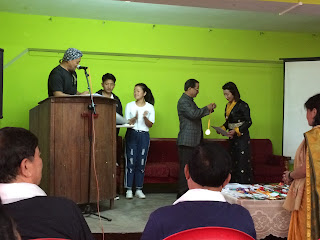





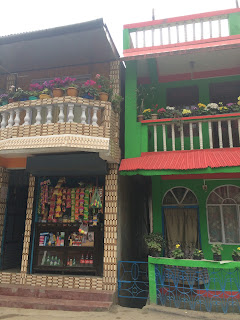






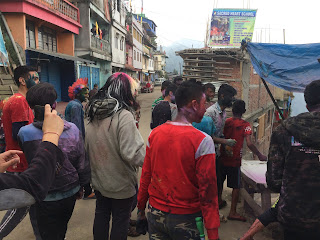
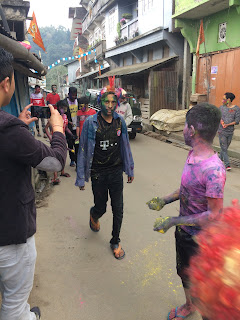




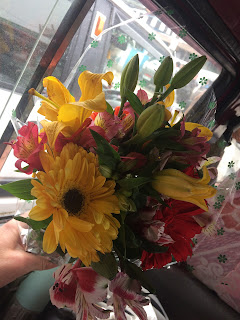



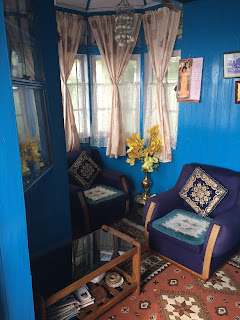


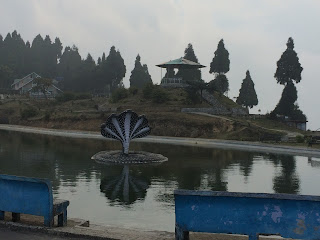

















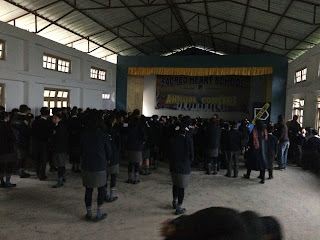

























Comments
Post a Comment